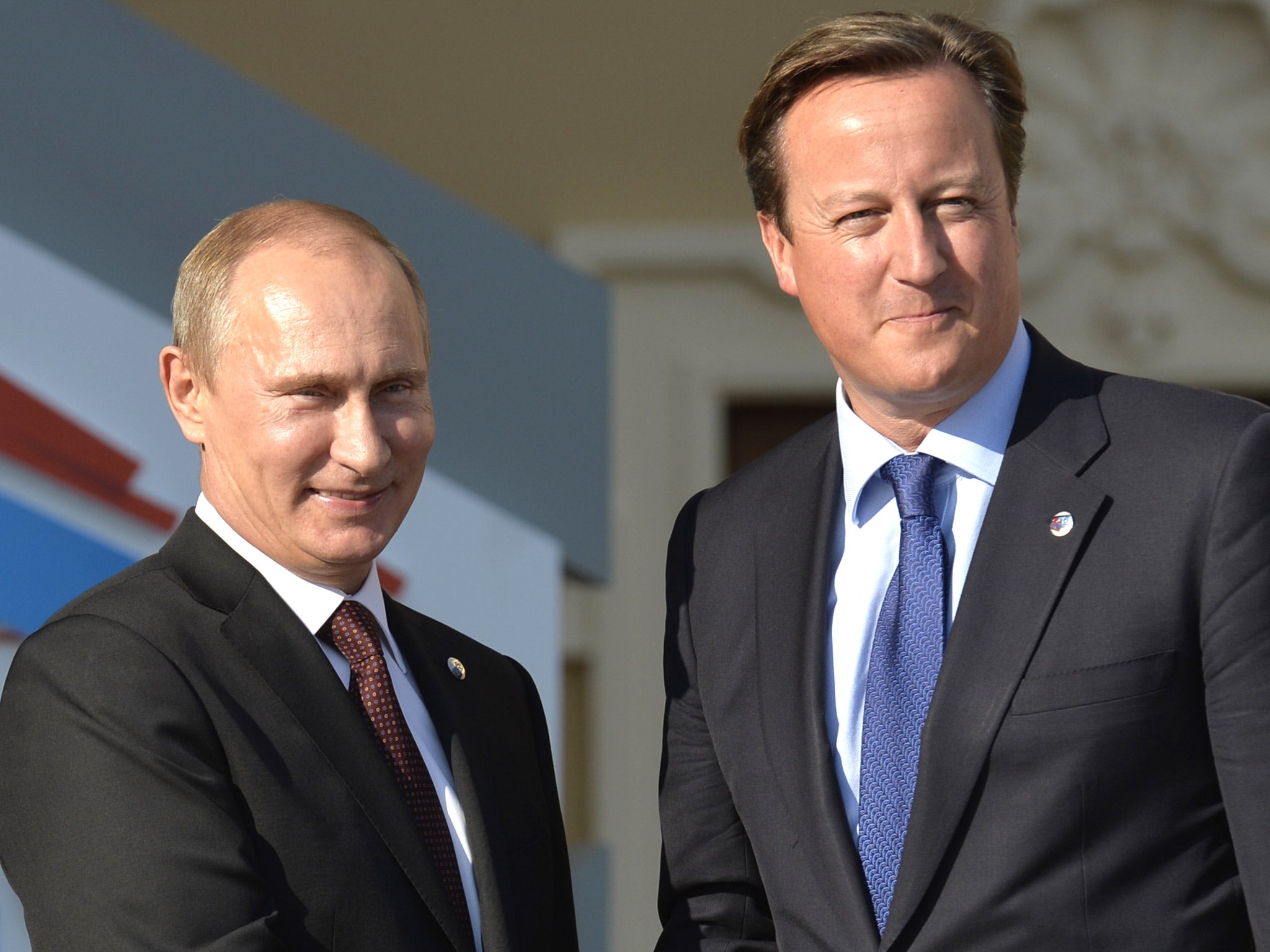Russian cheque books have led David Cameron astray from his natural allies

Your support helps us to tell the story
From reproductive rights to climate change to Big Tech, The Independent is on the ground when the story is developing. Whether it's investigating the financials of Elon Musk's pro-Trump PAC or producing our latest documentary, 'The A Word', which shines a light on the American women fighting for reproductive rights, we know how important it is to parse out the facts from the messaging.
At such a critical moment in US history, we need reporters on the ground. Your donation allows us to keep sending journalists to speak to both sides of the story.
The Independent is trusted by Americans across the entire political spectrum. And unlike many other quality news outlets, we choose not to lock Americans out of our reporting and analysis with paywalls. We believe quality journalism should be available to everyone, paid for by those who can afford it.
Your support makes all the difference.Last week’s turbulent but long-predictable events in Kiev have once again exposed the flat-footedness of David Cameron’s foreign policy. Out of sync with Britain’s natural allies in Europe and in hock to the Kremlin, the Prime Minister found himself confronted by a popular uprising against a corrupt and blood-stained regime.
In similar circumstances, three years ago almost to the day, Mr Cameron flew to Cairo and strode confidently onto Tahrir Square after Egyptian rebels had removed the West’s corrupt but loyal ally, Hosni Mubarak.
Yet as the Polish, French and German foreign ministers rushed to Kiev to broker a peace deal at the height of the fighting around Independence Square, for an embarrassingly long time, there was a chilling silence from Number 10 and the Foreign Office. There are, no doubt, many reasons for this backwardness in coming forward but one is clearly the close links Mr Cameron and his Foreign Secretary, William Hague, have developed with Vladimir Putin.
Until Ukraine’s regime opened fire on its own people, Mr Cameron was reluctant to become involved in what he seems to regard as Russia’s “sphere of influence”.
Unlike the German Chancellor, Angela Merkel, and the Polish Foreign Minister, Radoslaw Sikorski, both of whom understand the way the Kremlin operates and have a track record of resisting its bullying, Mr Cameron’s comprehension is limited, dictated by short-term domestic political interests and based on a misconception about how to deal with Moscow.
In common with every British Government since the fall of Margaret Thatcher, Mr Cameron’s coalition has shown that it sees Russia as a means to an end rather than an end in itself. Over the past two decades, as the networks of old “Russia hands” in the MoD and the Foreign Office were phased out, successive British governments have sought to cajole or coerce Russia into supporting Western interests variously in Yugoslavia, Iraq, Iran, Afghanistan, Libya and Syria. The price has been a willingness to turn a blind eye towards Moscow, a reluctance to confront unpleasant realities and a readiness simply to put up with aggression in the “near abroad”.
Mr Cameron, and before him Messrs Blair and Brown, have been happy to allow Mr Putin’s friends to help bail out BP, to buy up London mansions or to invest their ill-gotten gains in the City. As Russian cheque books have been waved around the capital and the establishment has opened its doors to the Novyye Russkie, the fact that Russia is an autocratic kleptocracy has been conveniently forgotten. So too has rampant corruption, the disappearance of a free press, widespread fraud at the ballot box in the last presidential election, continuing repression in the northern Caucasus and the murder of Alexander Litvinenko, who was killed in London with radioactive plutonium, allegedly on the orders of Mr Putin who plainly sees Mr Cameron as, in Lenin’s words a “useful idiot”.
For Mr Cameron, however, such matters are inconvenient but trifling when compared to the opportunity doing business with Mr Putin provides for short-term domestic political gain. Egged on, no doubt, by those members of his party who have struck up a variety of questionable friendships in the former Soviet empire and by colleagues who leapt headfirst into Conservative Friends of Russia, a lobby group whose “contact” in the Russian embassy was the son of a KGB/FSB general, Mr Cameron has set about “normalising” relations with this most abnormal of regimes.
His party continues to sit with Putin’s United Russia in the Council of Europe and he escorts British businessmen to Moscow with great fanfare on special trade missions.
Last week’s events in Kiev, however, should perhaps encourage him to keep Mr Putin at arm’s length. After all, the violence on the streets of Kiev may be a prelude of what is to come in Moscow. Mr Putin has shown how he expects his clients to deal with opposition and Maidan should serve as a reminder that appeasement is rarely the best policy.
Harold Elletson is a former MP and a writer with a longstanding interest in Russia and Eastern Europe
Join our commenting forum
Join thought-provoking conversations, follow other Independent readers and see their replies
Comments